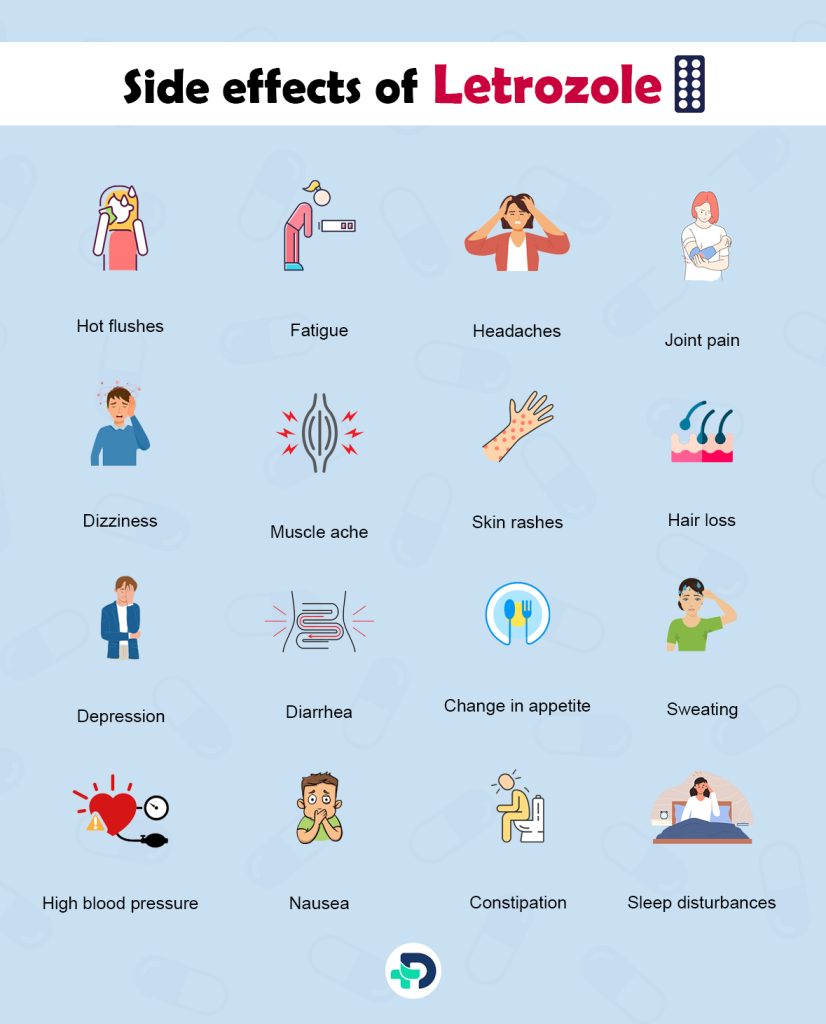Letrozole Tablets: Uses, Dosage, Side effects and Interactions

- Letrozole
- 22 Aug 2023
Overview
What is Letrozole?
Letrozole, also known by the brand name Femara, is a non-steroidal aromatase inhibitor medicine1Overview| Researched based study from Nlm.nih.gov It is a hormonal treatment medicine that has received FDA approval and is frequently used, especially in postmenopausal women, to manage hormonally sensitive breast cancer. This article provides a complete overview of Letrozole, including its mode of action, numerous uses, suitable dosage, administration, storage recommendations, contraindications, potentially harmful side effects, precautions, and interactions.

How does it work?
- Letrozole primarily blocks the enzyme aromatase, which transforms androgens into estrogen. 1Overview| Researched based study from Nlm.nih.gov
- Letrozole drastically lowers the body’s estrogen levels by inhibiting this enzyme activity.
- Patients with breast cancer whose tumors frequently develop in response to estrogen benefit most from this mechanism2Overview| Researched based study from Medlineplus.gov
- Letrozole successfully slows or even stops the growth of hormone receptor-positive breast cancer by denying the tumor cells with estrogen.
Uses
Uses of Letrozole
The drug letrozole is used for treating:
- Hormone receptor-positive early breast cancer in postmenopausal women receiving adjuvant therapy.
- Extensive adjuvant therapy is advised for postmenopausal women with early breast cancer who have already undergone standard adjuvant tamoxifen therapy.
- For postmenopausal women who have breast cancer that is progressed and either hormone receptor positive or undetermined3Uses| Researched based study from Novartis.com
Dosage
Letrozole Dosage
Dosage recommendations of Letrozole are:
- Letrozole is usually sold as oral pills with a strength of 2.5 mg3Dosage| Researched based study from Novartis.com
- The typical dosage advised for the treatment of breast cancer is 2.5 mg once daily, ideally at the same time each day4Dosage| Researched based study from Mayoclinic.org
- Sticking to the recommended dosage precisely and following the doctor’s recommendations is crucial.
Administration:
- The letrozole tablet needs to be swallowed once each day at the same time, whether or not you have food2Dosage| Researched based study from Medlineplus.gov
- Take it just as prescribed by the doctor; do not take it more often or in greater or lesser amounts.
- Letrozole may be necessary for a number of years or longer; it should not be stopped without talking to your doctor.
- If you don’t understand anything on the prescription label, ask your doctor or pharmacist to clarify it to you. Then, carefully follow the instructions.
Storage:
- Letrozole should be kept at room temperature and out of the reach of heat, moisture, and sunlight.
- Make sure it is kept out of the reach of kids and pets.
- If the drug has expired, never use it again, and always dispose of it properly5Storage| Researched based study from Clevelandclinic.org
Contraindications
Contraindications
Letrozole is quite successful for its intended use. However, not everyone should take it. People who should abstain from taking Letrozole include:
- Hypersensitivity – People who are known to be hypersensitive to the active ingredient of this drug or any of the ingredients shouldn’t take Letrozole3Contraindications| Researched based study from Novartis.com
- Pregnant or breastfeeding women – Letrozole should not be used by pregnant or nursing women since it may harm the developing fetus6Contraindications| Researched based study from Fda.gov
Side Effects

Side effects of Letrozole
Like all medications, Letrozole may cause specific side effects. The most typical negative effects include:
- Hot flushes
- Fatigue
- Headaches
- Joint pain4Side effects| Researched based study from Mayoclinic.org
- Dizziness
- Muscle ache
- Skin rashes4Side effects| Researched based study from Mayoclinic.org
- Hair loss
- Depression
- Diarrhea
- Palpitation
- Constipation
- Vaginal bleeding
- Change in appetite 7Side effects| Researched based study from Breastcancernow.org
- Reduced sex drive
- Increased sweating.
- Sleep disturbances.
- High blood pressure
- Vaginal dryness and itching 7Side effects| Researched based study from Breastcancernow.org
- Nausea and vomiting
- Decreased bone density
- High blood cholesterol
Precautions
Risk and precautions
Inform your doctor about any existing allergies or medical conditions before beginning letrozole treatment.
Letrozole may increase the risk of the following:
- Allergy – If you’ve ever experienced an allergic response to Letrozole or any inactive chemicals in Femara, you shouldn’t use it. If you have any questions regarding your medication allergies, speak to your doctor.
- Liver injury – People with liver disorder should discuss it with the doctor as Letrozole is eliminated from the system by the liver; people might require a reduced dosage of Femara. For instance, rather than taking Femara every day as usual, the doctor might advise that they take it once every other day.8Precautions| Researched based study from Nlm.nih.gov
- Bone loss – Letrozole may raise an individual’s chance of developing bone conditions, including osteoporosis. Bone mineral density can decline. Regular bone density testing and the right supplements may be advised9Precautions| Researched based study from Breastcancer.org
- High cholesterol risk – Some people who take Letrozole may experience elevated cholesterol levels and may require ongoing monitoring.
- Dizziness – There may be drowsiness, lightheadedness, and fatigue as side effects of Letrozole, and people should be warned not to operate heavy machinery or drive after taking the drug5Precautions| Researched based study from Clevelandclinic.org
- Embryo-Fetal Toxicity – When given to pregnant women, Letrozole can harm the fetus. Females of reproductive age who are sexually active should use reliable contraception and test for pregnancy regularly.
- Nursing mothers – Femara has the potential to induce significant adverse effects in breastfed infants; thus, lactating mothers are advised not to breastfeed their infants for at least three weeks while using Femara.
- Fertility – Only women who have experienced menopause should receive this treatment. There is a very slim risk that they could become pregnant because of how it functions. Hence, people should discuss the best method of contraception with their doctor10Precautions| Researched based study from Cancerresearchuk.org
Interactions
Letrozole Interactions
Letrozole may interact with some medicines, reducing their effectiveness or increasing their side effects. Typical interactions may be as follows:
- Tamoxifen – Tamoxifen and Letrozole have opposite effects on estrogen receptors and may lower plasma levels of Letrozole; therefore, pairing them together is typically not advised. 11Interactions| Researched based study from Dailymed.nlm.nih.gov
- Medicines containing estrogen – Letrozole should not be used concurrently with estrogen-containing medicines like estradiol as this may decrease the drug’s effectiveness and lessen its ability to protect against breast cancer12Interactions| Researched based study from Nlm.nih.gov
Bottom Line
The Bottom Line
Before starting Letrozole, patients should review their existing prescriptions with their doctors to prevent potential drug interactions. This includes nutritional, herbal, prescription, and over-the-counter supplements. Even though Letrozole is typically tolerated well, it’s essential to be informed of possible side effects, safety measures, and drug interactions. Before starting a new medication, always see a doctor to ensure a safe and effective course of treatment.
Any feedback on this article?
 This Articles content was accurate
This Articles content was accurate Very Informative Article
Very Informative Article I have a question or a comment
I have a question or a comment
 This article contains inaccurate content
This article contains inaccurate content This article was not helpful
This article was not helpful I have a question or a comment
I have a question or a comment
We appreciate your helpful feedback!
Checkout our social pages
References
-
National Library of Medicine
Letrozole | Overview
-
Medline Plus
Letrozole | Overview
-
NOVARTIS PHARMACEUTICALS
FEMARA (letrozole) tablets | Uses
-
Mayo Clinic
Letrozole (Oral Route) | Dosage
-
Cleveland Clinic
Letrozole Tablets | Storage
-
FOOD AND DRUG ADMINISTRATION
Femara (letrozole) tablets | Contraindications
-
Breast Cancer Now
Side effects of letrozole (Femara)
-
National Library of Medicine
Letrozole | Precautions
-
Breastcancer.org
Letrozole | Precautions
-
Cancer Research UK
Letrozole (Femara) | Precautions
-
DailyMed
Letrozole | Interactions
-
National Library of Medicine
Precautions for Patients Taking Aromatase Inhibitors | Interactions




































